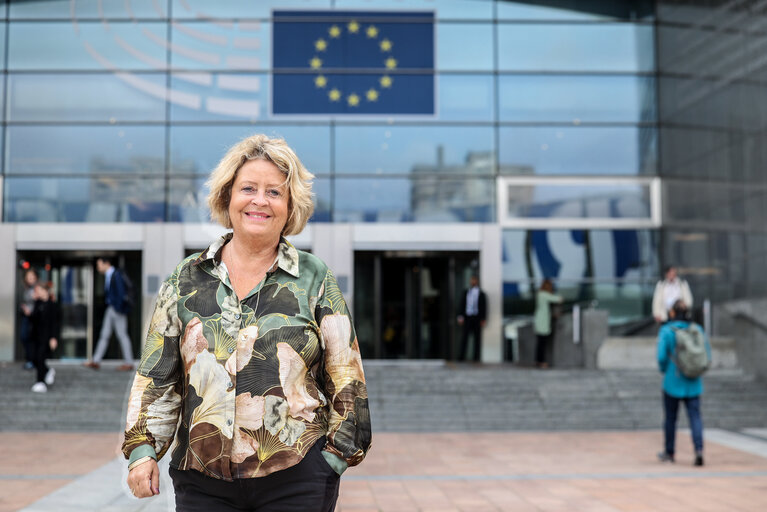Danish MEP Stine Bosse (Renew Europe), Vice-Chair of the SANT Committee on Public Health, believes the EU must treat health not only as a social responsibility, but as a matter of investment and security. That means reversing cuts to the EU health budget, tackling antimicrobial resistance (AMR) with coordinated European action, and delivering long-overdue progress on rare diseases. “We are still waiting,” she says, calling out the lack of a timeline for an EU Rare Disease Action Plan.
In this interview, she lays out her priorities on rare diseases, AMR, access to medicines, and the pharmaceutical package, and explains why the upcoming Danish EU Council Presidency is a chance to move long-stalled reforms forward.
MEP Bosse, thank you for speaking with EU Perspectives. What are your key priorities for the European Parliament’s SANT Committee?
My first priority was to establish SANT as its own, independent committee, and we did it. That was long overdue. Some people claimed that health was no longer a pressing issue because COVID was “over.”
I had a completely different view. Even during my campaign, I identified two areas where EU collaboration is absolutely essential: rare diseases and antimicrobial resistance (AMR). These are now my core priorities.
You might be interested
When it comes to rare diseases, I include classical rare diseases as well as rare cancers, because those are often linked. These are areas where we don’t have enough data, we don’t have enough expertise, and we don’t have enough patients in any one country to find solutions alone. So we need to work together to ensure the best outcomes for the people affected.
Sharing knowledge helps rare diseases diagnoses
How urgent is the need for action on rare diseases?
Extremely urgent. Right now, it still takes anywhere between five and ten years for many patients to receive a diagnosis, depending on where they live in Europe. That’s devastating for families, imagine being the parent of a severely ill child and having no diagnosis, no treatment options, and no idea what’s going on. That needs to change.
We already have structures like the European Reference Networks (ERNs) and the European Health Data Space, but they’re not well connected. We need to invest in this area and make it easier for hospitals, doctors, researchers, and yes, the pharmaceutical industry, to collaborate across borders. That’s the only way we’ll make progress.
How can we accelerate diagnosis in rare diseases?
It’s about financial support, yes, but also about sharing knowledge. One way forward is using artificial intelligence, not as a replacement for doctors, but as a support tool. If primary care doctors across Europe have access to shared data and AI tools, they can more quickly identify symptoms that may point to a rare disease. The key is collaboration, doctors can’t do it alone, especially when they’ve never encountered the condition before.
Is this vision part of a Rare Disease Action Plan at EU level?
That’s what I’m pushing for. Unfortunately, we still don’t know when, or if the Commission will present such a plan. I’ve asked repeatedly: if not now, then when? I’m not even asking for an immediate plan, just a timeline. If they say 2026, fine. But let’s set a date and make it concrete. Families cannot keep waiting.
How do you view other disease-specific plans, such as the one for cardiovascular health? Are there risks of competition between conditions?
I understand why cardiovascular disease is high on the agenda, it affects a large number of people. But because it’s so prevalent in every country, national systems can handle much of it on their own. Rare diseases, by contrast, can’t be tackled effectively at national level. There simply aren’t enough patients, doctors, or knowledge in any one country. So EU cooperation isn’t just useful, it’s essential.
Antimicrobial resistance needs a joint response
You’ve also prioritised antimicrobial resistance (AMR). Why?
The reason is similar: no country can solve AMR alone. Denmark recently published a new national action plan, which is important, but it’s not enough. I’ve seen firsthand how this problem crosses borders, my bonus grandson was born two months early and came home from Greece with a resistant infection. We live, work, and travel across Europe, so bacteria do too. That’s why we need a coordinated European response.
The Danish Council Presidency has signalled that AMR will be one of its priorities in the health field, and I’m very grateful for that. – MEP Stine Bosse, Renew Group Europe
We also have to recognise the scale of the threat. In just over 20 years, AMR could become the leading cause of death globally. It already affects people with preconditions, diabetes, cancer, rare diseases, and it’s one of the main reasons why cancer patients sometimes don’t survive chemotherapy. We need to start treating AMR as the global health security crisis it is.
Is AMR high enough on the political agenda right now?
I believe it’s finally getting there. The Danish Council Presidency has signalled that AMR will be one of its priorities in the health field, and I’m very grateful for that. Because it’s long overdue. We can invest in tanks, drones, and everything else, but if we don’t have basic antibiotics, what are we really protecting? Health is security. That mindset needs to be reflected in our priorities.
The pharmaceutical package touches on AMR. Are you satisfied with the current proposals?
No, not at all. It’s not nearly ambitious enough. Yes, it’s positive that AMR is included. Yes, the idea of vouchers is a step in the right direction. But there are far too few of them.
We should view AMR incentives as investments in our shared future, not as costs. I was disappointed to see some Member States, including my own, worrying about how “expensive” this would be. Let’s be honest: it’s going to be far more expensive if we do nothing.
What action will you take on AMR as the legislation moves forward?
I’m the shadow rapporteur for Renew Europe on the pharmaceutical package, so I’ll do everything in my power to strengthen the AMR provisions. And I believe I have strong support within the SANT Committee. There’s growing awareness among my colleagues that the package needs to do more, not less, on AMR.
EU’s pharma system must be modernized
Beyond AMR, what’s your general view of the pharmaceutical package?
I think it has improved since the original proposal, but this may be our only real chance to modernize Europe’s pharmaceutical system. If we don’t get it right, the EU risks falling behind, just as we did in the digital space. We must make it attractive for pharma companies to innovate in Europe and stay in Europe.
That’s in everyone’s interest, not just the industry’s, but also the patients’. COVID showed us the value of having a strong pharmaceutical sector close to home. But at the same time, the industry must also do more to ensure equal access across the EU.

How do you view the concerns from industry over regulatory data protection (RDP)?
I understand them. I do think we may need to offer stronger incentives to attract investment. But if the Parliament is going to support enhanced RDP or other measures, then the industry also has to step up.
It has to be a two-way street. If we help the industry compete, they must help us improve access, especially in smaller countries like Bulgaria, Romania, or even Denmark. Why did Bulgaria go six months without antibiotics last year? That’s not acceptable. Let’s talk openly about it.
Have you received any solid ideas from companies so far?
Some, yes. But I still think more concrete, feasible proposals are needed. Not everything can be solved overnight, but we need plans. We need ideas that acknowledge the realities of small markets. And if those problems are due to national policies, let’s talk about that too openly, together.
Health should get more political attention
What are your expectations for the pharma package under the Danish Presidency?
I’m hopeful. Denmark has a well-run pharmaceutical sector and a strong record in life sciences. That’s an opportunity, and a responsibility. My hope is that we can use the Danish Presidency to unlock some of the barriers that are holding back this legislation, not just for the industry, but for patients across Europe.
Denmark has a well-run pharmaceutical sector and a strong record in life sciences. That’s an opportunity, and a responsibility.
The opening of the trilogue felt promising. There was a good spirit in the room. But this must be treated as a once-in-a-generation opportunity. I’d rather we take the time to get it right than rush through something mediocre, only to need an “omnibus fix” in a year. We’ve waited this long, let’s make it count.
What else would you like to see under the Danish Presidency?
I’d really like to see progress on the Biotech Act. We need a broader EU life sciences strategy that includes biotech, health, and sustainability. Denmark’s national strategy could serve as inspiration, though of course we need something more ambitious at European level.
Turning to the EU budget: is health getting enough financial attention in the next multiannual framework?
I’m the shadow rapporteur for the 2026 EU budget and have already tabled a substantial section on health. I’m pushing hard to restore the €1 billion in funding that was lost, and ideally, increase it. Health isn’t just social policy. It’s investment. It’s also a security issue.
If we don’t make meaningful progress on AMR, we are not safe. We won’t be able to look future generations in the eye and say we’ve left them a secure health system. For me, that’s a moral obligation.
So, in your view, does health have the political attention it deserves?
Not yet, but it must. I met with a director from Ukraine who’s in charge of basic healthcare during wartime. He said it plainly: health is also security. And I agree. What good is defending ourselves if we can’t treat an infection?
We already know that war zones, like Ukraine, accelerate AMR. This is all connected. And we need to start thinking, and acting, accordingly.










